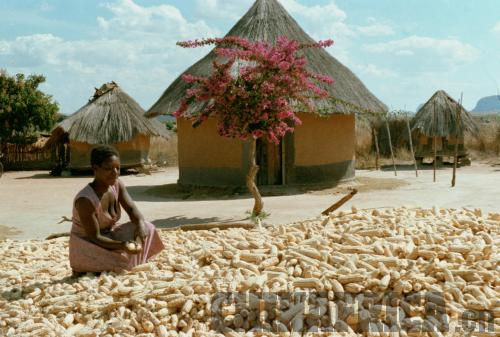| 
Awuissa Walla has no regrets over choosing farming as a profession. He earned a degree in agronomy a decade ago, and, borrowing money from friends, set himself up on an 18-hectare plot at Badja, some 50 km from Lomé, the Togolese capital.
"We often say here that you can never go wrong with the land, and I can confirm this as I'm in the business myself," the 40-year-old Walla told the International Press Service (IPS).
"I grow a wide range of things to try to get the most from my farm," he said. His land is dotted with all sorts of fruit, especially oranges, lemons, mandarins, bananas and pineapple.
Part of the land is dedicated to coconut and oil palms, and there is a stand of teak and heaps of yams in another corner, but his main crop is maize.
"I grow maize on 8 hectares and I usually harvest 4 tons per season – around 40 sacks of maize," he said. He plants maize twice a year, harvesting it three months later and earning about $1,250 from each crop.
Walla has hired sharecroppers who use modern methods to increase their production, including a tractor. Some of the crops are irrigated using water from a borehole on the property.
He is also a beneficiary of a program set up by the Togolese Government to supply farmers with fertilizer, the $1.3-billion National Investment Program in Agriculture (PNIASA).
PNIASA has made 30,000 tons of fertilizer available to farmers each year at heavily subsidized prices, with the program paying roughly a third of the cost of this vital farm input.
The Togolese Government wants to bring the country's subsistence agriculture sector into a true market economy, and has indicated that improving the quality and availability of seed will be its next priority.
"The government has helped us with seed and fertilizer, which has allowed us to have a good harvest," said Donné Amémadon, a smallholder in Tsévié, north of Lomé.
Each of the country's last three growing seasons smashed records for grain production, particularly for maize and sorghum - climbing from around 31,000 tons in 2009 to 95,000 tons in 2010 and 110,000 tons in 2011.
The surplus was sold through the National Food Security Agency (ANSAT) for use in other African countries. At the beginning of this year, the United Nations World Food Program (WFP) bought 8,000 tons of maize, as compared to 6,000 last year.
On April 7, WFP and ANSAT signed a new contract under which Togo will supply 10,300 tons of maize to famine-stricken Niger, at a cost of $4.8 million, which will be paid directly to producers. WFP will also buy a further 6,000 tons of grain destined for Ghana.
In addition to the country's support for smallholders, farmers have been blessed with favorable weather.
"Our country still enjoys excellent rainfall which, in combination with sound agriculture policy, ensures our food security," said Zackari Nandja, Minister of Sanitation and Rural Water. But, he said, if agriculture is truly to serve as a motor for development, then the management of water will have to be taken into account.
Agriculture extension worker Koudjo Kligbé agrees, "We need appropriate technical advice for farmers at all levels, especially regarding water management. We need to start from what farmers already know, from what they are already doing, and then we can see what new things they can learn."
According to official figures, agriculture employs 70 percent of Togo's population of 6 million and represents 40 percent of GDP. Around 10 percent of the national budget is allocated to this sector.
"We have launched many projects, including the Project to Support Agricultural Development, which will help small farmers develop their land and construct storage facilities," said Messan Kossi Ewovor, Minister of Agriculture. He encouraged smallholders to join together in organizations which will strengthen their voices in decision-making in areas that affect them.
The International Fund for Agricultural Development is providing $13.5 million in financing for this program.
(Source: IPS Africa) |